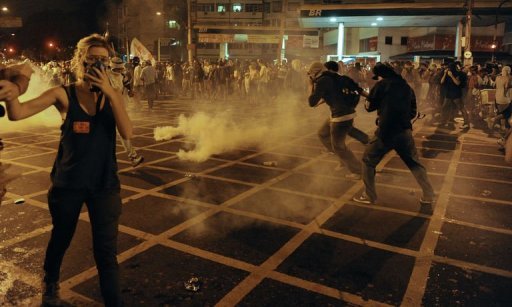Protesters armed with screwdrivers and slingshots clashed with police near Rio’s legendary Maracana football stadium where Brazil defeated Spain to win a third successive Confederations Cup.
Earlier in the day, thousands of demonstrators marched toward Maracana, most of them peacefully.
But a small group of hooded protesters lit a fire in the street and hurled stones at police who responded by firing tear gas and rubber bullets as police helicopters circled overhead.
The demonstrators ran in all directions under a cloud of tear gas but police awaited them at every corner.
The demonstrators responded to calls on social media to turn out to back the national squad but also to protest the country’s inadequate public services — a key gripe at the core of two weeks of demonstrations that have rocked the South American giant.
More than 11,000 police and troops were mobilized to ensure security for 78,000 fans at the Maracana arena.
The hosts’ victory thrilled the partisan crowd, most of whom wore the Selecao’s green and yellow jersey.
The tournament was hit by unprecedented social unrest, with more than 1.5 million Brazilians taking to the streets nationwide over the past two weeks.
Hundreds of demonstrators also rallied in the Tijuca district, about one mile from Maracana, dancing and chanting: “FIFA, pay my (bus) fare” or “Maracana is ours.”
Police invited the country’s Bar Association as well as federal and state prosecutors to monitor their security deployment following charges of police brutality during earlier protests.
Despite the festive atmosphere, many Brazilians are angry at the $15 billion being spent to host the tournament and next year’s World Cup.
Protesters complain the government has found billions of dollars to build brand new stadiums for 12 World Cup host stadiums while transport, education and health remain underfunded.
Some of the demonstrations have been marred by sporadic violence and vandalism.
Leftist President Dilma Rousseff, whose popularity has plunged since the start of the unrest, did not attend the final.
Two weeks ago, she and FIFA President Sepp Blatter were booed by demonstrators at the opening game of the tournament in Brasilia.
The mass protests, which appear to tapering off this week, were the largest in Rio where they brought 300,000 people into the streets Sunday on June 20, when they degenerated into violence, looting and scenes of urban guerrilla warfare.
Despite the social turmoil, which began in Sao Paulo in early June over the rising cost of public transport, polls show more than two-thirds of Brazilians support their country hosting the World Cup for the first time since 1950.
Brazil is the most successful country in World Cup history, with five wins.

COMMENTS
Please let us know if you're having issues with commenting.